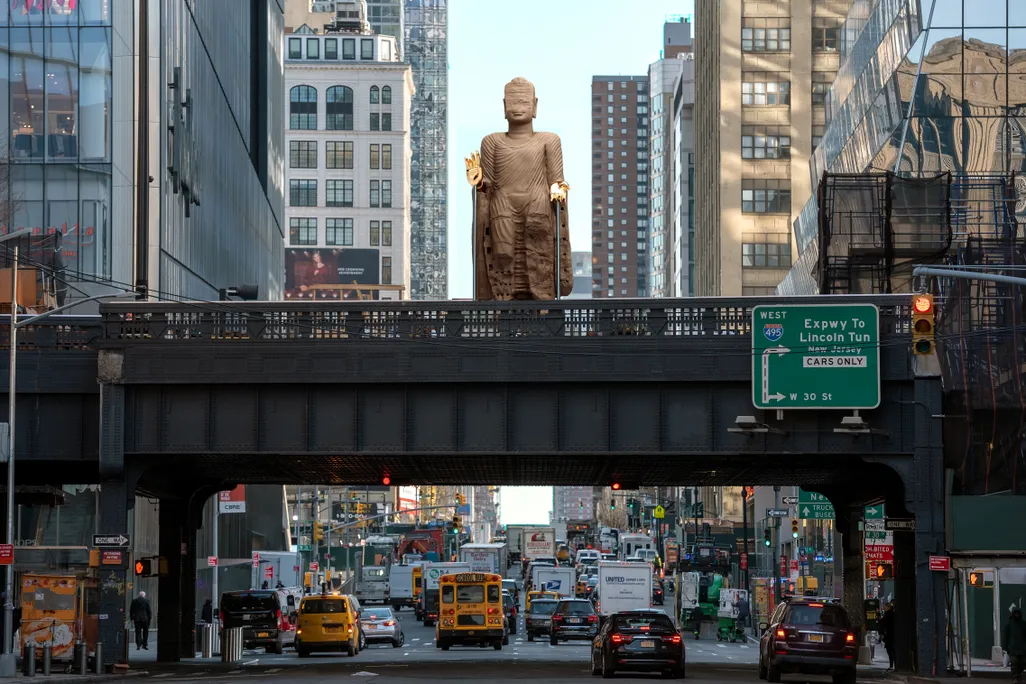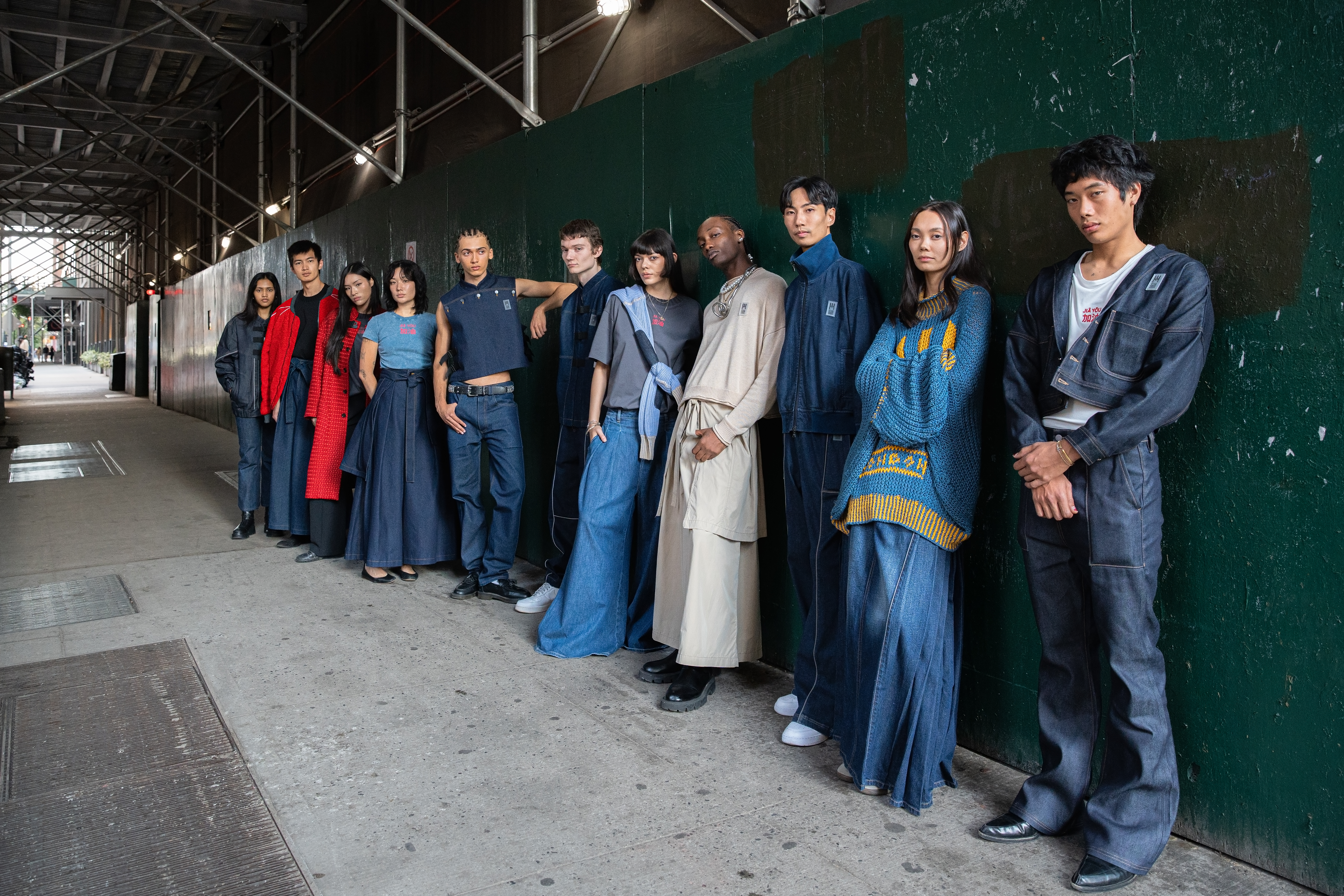Gruelling labor may not seem like the most obvious inspiration for a sleek new fashion line, yet for rising label Private Policy, the building of the Transcontinental Railroad — and the erasure of the Chinese workers who made it happen — is just the latest in a series of hard-hitting issues that the New York- and Shanghai-based brand have placed at the heart of their work.
“Drawing inspirations from roughly the 20,000 Chinese laborers who came to California from southern China to build the American Transcontinental Railway in the 1860s, our latest collection FW21 ‘We Remember You’ pays attribute to those Chinese workers whose stories have largely remained untold, especially in the history books of the US,” explains co-founder Siying Qu.
Launched by Qu with her schoolmate Haoran Li upon their graduation from the esteemed Parsons School of Design in 2015, genderless label Private Policy fashions the launches of its new lines like newspaper exclusives. Each collection tackles a new social, political or cultural topic, usually one that the founders feel is underdiscussed in mainstream media but deserves more attention. The duo’s reflections on that selected issue then influence the entire design process, from the choice of knot buttons, collars, body accessories, or fabric materials, to the overall attitude of the collection.

Private Policy FW21 Shanghai Fashion Week runway (image: courtesy Private Policy)
In previous seasons, the label has taken on body positivity, self-confidence and acceptance, challenging conventional beauty standards and aiming to empower others in the time of Covid-19 (SS21). They’ve explored and informed the public of the unethical practices of the American pharmaceutical industry in its marketing spend, pricing and collusion with insurance companies (FW20). And they’ve celebrated pride and resistance upon the 50th anniversary of the Stonewall demonstrations in New York City (SS20).
Another recent project is “The Beauty of Being Deaf,” a partnership with American activist and artist Chella Man through which the label hopes to raise awareness for deaf and hard of hearing communities, celebrating the beauty within.
“We want to use our brand as a medium to share our perspectives and spark meaningful conversations on social issues that are relevant to the youth around the world,” says Qu. “As trained fashion designers, we understand how amazing a platform is regarding delivering messages — it is able to build on a whole story through the combination of clothing and accessories, as well as rich visual content including images and videos, physical fashion shows and events.”
Collaborating with the Museum of Chinese in America (MOCA) in New York, for FW21 the duo set out to craft a collection featuring a blend of American workwear and traditional Chinese elements — updated looks of utilitarian outfits that Transcontinental Railroad workers used to wear combined with the brand’s trademark club-kid vibes. It could come off as tasteless, but Private Policy works to educate its audiences, while also ensuring its lines have a cutting-edge look.
Related:
 Chinese Exclusion: Celebrating the Workers Who Helped Build the Transcontinental Railway150 years ago this month, one of the most famous photographs in American history commemorated the completion of the transcontinental railway. But where are the Chinese workers who played a key role in building the railroad?Article May 14, 2019
Chinese Exclusion: Celebrating the Workers Who Helped Build the Transcontinental Railway150 years ago this month, one of the most famous photographs in American history commemorated the completion of the transcontinental railway. But where are the Chinese workers who played a key role in building the railroad?Article May 14, 2019
“I think it’s very important for fashion labels to speak to the society and communities people care about,” says Li. “We are also quite motivated by seeing that the entire fashion industry has improved in that regard compared to before. We want to keep working on that.”
“The authenticity we have by caring about social issues also helps us stay more connected with our communities and customers,” adds Qu.
For their latest collection, the issues hit particularly close to home for the pair.
“In March 2020, when there was barely a case in New York, the city’s Chinatown was already empty, striking a contrast with other parts of town,” says Qu of Private Policy’s FW21 line. “That’s when we started to see a surge of xenophobia against Asians around the world, which prompted us to ask ourselves — what we can do as fashion designers with Chinese backgrounds?”
After reading the book Ghosts of Gold Mountain: The Epic Story of the Chinese Who Built the Transcontinental Railroad by the historian and Stanford professor Dr. Gordon Chang, Qu and Li were struck deeply by the unfair treatment of Chinese laborers in the past and its echoes with the ongoing racism and xenophobia against Asian communities today.
The duo reached out to MOCA, an institution known for having extensive resources on Chinese American heritage, discovering in the process that Dr. Chang was a long-time advisor to the museum. This marked the beginning of their collaboration, with the designers gaining access to valuable historical archives including original photos of the railroad workers, and this serving as a starting point for their crafting of the new collection.

An invite to Private Policy’s FW21 show at Shanghai Fashion Week, designed to look like the front page in a newspaper (image: courtesy Private Policy)

Private Policy FW21 Shanghai Fashion Week runway (image: courtesy Private Policy)
This journey ultimately manifested in looks such as a rendition of a traditional hat from China’s Pearl River Delta region with heavy-knit metal chains, a black and white plaid dress in checker patterns together with a cross-body cylinder shoulder bag, and overshirts with playful half-body harness details. There were also black work boots that blend with the loose fit suit pants, as well as a graphic black T-shirt with the backwards spelling of wonton “Not Now,” taking reference from Chan is Missing, a 1982 movie that challenges the stereotyping of early Chinese immigrants in the US.
Not that the focus on serious social issues means the designs don’t have a sense of fun. Private Policy’s Shanghai Fashion Week show in early April integrated pop culture with distinct club kids vibes helped along by a soundtrack of hip hop, techno and traditional Chinese instrumentation. Their online launch for the collection mimicked popular TikTok trends (watch above).
It’s a mix that has caught the eye of a number of celebrities since Private Policy launched six years ago. The likes of super model Kendall Jenner, Chinese megastar Angelababy, and pop idols Jackson Wang and Kris Wu have all embraced the brand and its messaging.

Founders of Private Policy, Siqing Yu and Haoran Li (image: courtesy Private Policy)
Both Qu and Li were in China for Shanghai Fashion Week, but the former will soon return to New York and the label will continue to be split across the two cities — New York for design and samples; Shanghai for manufacturing. Private Policy are looking to tap more into the young communities in China however and are currently devoting more time and energy to learning more about Chinese social media platforms and their functions, such as content-sharing site Xiaohongshu, the mini-programs of messaging app WeChat, and ecommerce platform Tmall.
“We may soon focus on a local topic that is more relevant to communities here, as a way to connect more with the Chinese youth,” says Qu. But regardless of where they are putting their messaging, Private Policy are intent on “staying true to our original DNA by continuing to speak up on social issues.”

Private Policy SS21 Collection (image: designed by Sabina Islas with images courtesy of Private Policy)
“Different communities care about social issues, but on different cultural levels,” she continues. “For the theme of each collection, audiences around the world interpret it differently. Take this season for example, some Chinese audiences may view it more from the angle of reimagining Chinese culture and its fusion with Western aesthetics, while for the US it was more about a hidden history event in the textbooks. Though I found that a lot Chinese audience are very interested in what’s going on with the world, in a way that is more of what I see in America.”
But whether they’re talking to Chinese or American audiences, in a world where it’s easy to get lost in dazzling garments and fake news, the emergency of the refreshing, empowering and inclusive fashion that labels such as Private Policy are pushing may be exactly what the industry needs.
Cover image: designed by Sabina Islas with images courtesy of Private Policy


















